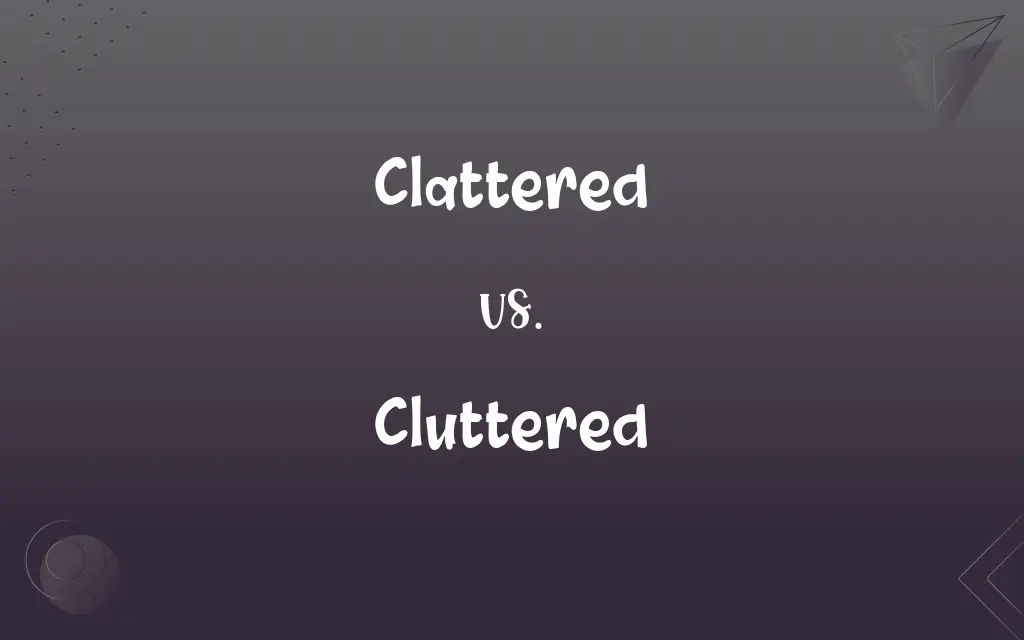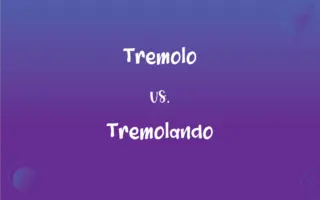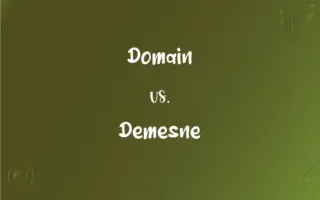Clattered vs. Cluttered: What's the Difference?
By Harlon Moss & Aimie Carlson || Updated on May 30, 2024
"Clattered" refers to making a loud, rattling sound, while "cluttered" means being untidy or filled with too many things. Both indicate a sense of disturbance, but in different contexts: sound versus visual disorganization.

Key Differences
"Clattered" describes a loud, harsh noise often caused by objects striking each other. For example, dishes clattering together in the sink produce a clattering sound. This term emphasizes the auditory aspect of disruption. "Cluttered," on the other hand, refers to a space filled with too many items, resulting in disorder. A cluttered desk, for instance, is one with papers, pens, and other items scattered haphazardly. This term focuses on visual and spatial disorganization.
While "clattered" suggests an immediate, often sudden, auditory disturbance, "cluttered" implies a persistent state of untidiness. For instance, a noisy drop of a metal tray clattering on the floor contrasts with a room cluttered with toys and clothes over time.
The impact of "clattered" is momentary and linked to specific events, such as the clattering sound of a dropped pot. In contrast, "cluttered" describes an ongoing condition, like a cluttered garage needing constant organization.
"Clattered" often conveys an accidental or unintentional noise, such as clattering footsteps in a hallway. Conversely, "cluttered" usually results from neglect or accumulation, such as a cluttered kitchen countertop over weeks.
While both terms indicate a form of disturbance, "clattered" is specific to noise, disrupting auditory peace. "Cluttered" affects visual and spatial order, making environments feel chaotic and cramped.
ADVERTISEMENT
Comparison Chart
Definition
Making a loud, rattling noise
Being untidy or filled with too many things
Context
Auditory disturbance
Visual and spatial disorganization
Duration
Momentary
Persistent
Cause
Usually accidental or sudden
Often due to neglect or accumulation
Impact
Disrupts auditory peace
Disrupts visual and spatial order
ADVERTISEMENT
Clattered and Cluttered Definitions
Clattered
To move with a noisy sound.
The old truck clattered down the street.
Cluttered
Filled with too many things, making it untidy.
Her desk was cluttered with papers and books.
Clattered
To strike objects together noisily.
The dishes clattered in the sink as she washed them.
Cluttered
Lacking order due to excess items.
The kitchen countertop was cluttered with appliances.
Clattered
To produce a series of sharp, rattling sounds.
The hail clattered against the window.
Cluttered
To accumulate in a disorderly manner.
Toys cluttered the living room floor.
Clattered
To make a loud, rattling sound.
The metal pan clattered to the floor.
Cluttered
Causing a sense of disorganization.
His mind felt cluttered with too many thoughts.
Clattered
To make a rattling sound.
Cluttered
A confused or disordered state or collection; a jumble
Sorted through the clutter in the attic.
Clattered
To move with a rattling sound
Clattering along on roller skates.
Cluttered
A confused noise; a clatter.
Clattered
To talk rapidly and noisily; chatter.
Cluttered
To fill or spread over in a disorderly manner
Boxes cluttered the garage.
Clattered
To cause to make a rattling sound.
Cluttered
To make disorderly or hard to use by filling or covering with objects
I cluttered up my desk with old memos.
Clattered
A rattling sound
The clatter of dishes in the kitchen.
Cluttered
To run or move with bustle and confusion.
Clattered
A loud disturbance; a racket
The clatter of the subway train.
Cluttered
To make a clatter.
Clattered
Noisy talk; chatter.
Cluttered
Scattered with a disorderly mixture of objects that take up space; littered.
Clattered
Simple past tense and past participle of clatter
Cluttered
Simple past tense and past participle of clutter
Clattered
To cause a loud disturbance.
The children clattered around the playground.
Cluttered
Filled or scattered with a disorderly accumulation of objects or rubbish;
The storm left the driveway littered with sticks and debris
His library was a cluttered room with piles of books on every chair
Cluttered
Overcrowded or messy.
The room was cluttered with old furniture.
FAQs
What does "cluttered" mean?
"Cluttered" means being untidy or filled with too many things.
What does "clattered" mean?
"Clattered" means making a loud, rattling noise.
Can "clattered" be used to describe movement?
Yes, it can describe moving with a noisy sound.
Is "clattered" related to a specific type of sound?
Yes, it specifically refers to sharp, rattling noises.
Can "cluttered" describe temporary conditions?
Yes, but it usually suggests a longer-lasting state.
Is "cluttered" always negative?
Generally, yes, as it implies disorganization.
Does "cluttered" imply cleanliness?
Not necessarily; it implies disorder, not dirtiness.
Is "clattered" used in specific contexts?
It is often used to describe sounds involving metal or hard surfaces.
Can "clattered" describe human activity?
Yes, such as people clattering around noisily.
Can "clattered" describe an intentional sound?
Usually, it describes unintentional or sudden noises.
How long does a "clattered" sound last?
It is typically momentary.
Can "clattered" be positive?
It is generally neutral or negative, as it indicates disruption.
Does "cluttered" affect productivity?
Yes, a cluttered environment can hinder efficiency.
Is "cluttered" always visible?
It usually refers to visual disorder but can be metaphorical.
Does "cluttered" only refer to physical spaces?
No, it can also describe abstract concepts like a cluttered mind.
Is "clattered" commonly used in literature?
It is used to evoke specific sounds and actions.
How is "cluttered" different from "messy"?
"Cluttered" implies excessive items, while "messy" can be general untidiness.
What emotions does "cluttered" evoke?
It often evokes feelings of stress or overwhelm.
Can "clattered" describe a sequence of sounds?
Yes, like a series of clattering footsteps.
Can "clattered" be pleasant?
Rarely, as it usually signifies noise and disruption.
About Author
Written by
Harlon MossHarlon is a seasoned quality moderator and accomplished content writer for Difference Wiki. An alumnus of the prestigious University of California, he earned his degree in Computer Science. Leveraging his academic background, Harlon brings a meticulous and informed perspective to his work, ensuring content accuracy and excellence.
Co-written by
Aimie CarlsonAimie Carlson, holding a master's degree in English literature, is a fervent English language enthusiast. She lends her writing talents to Difference Wiki, a prominent website that specializes in comparisons, offering readers insightful analyses that both captivate and inform.
































































